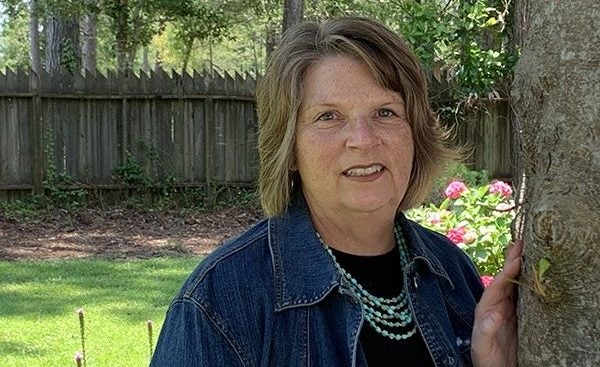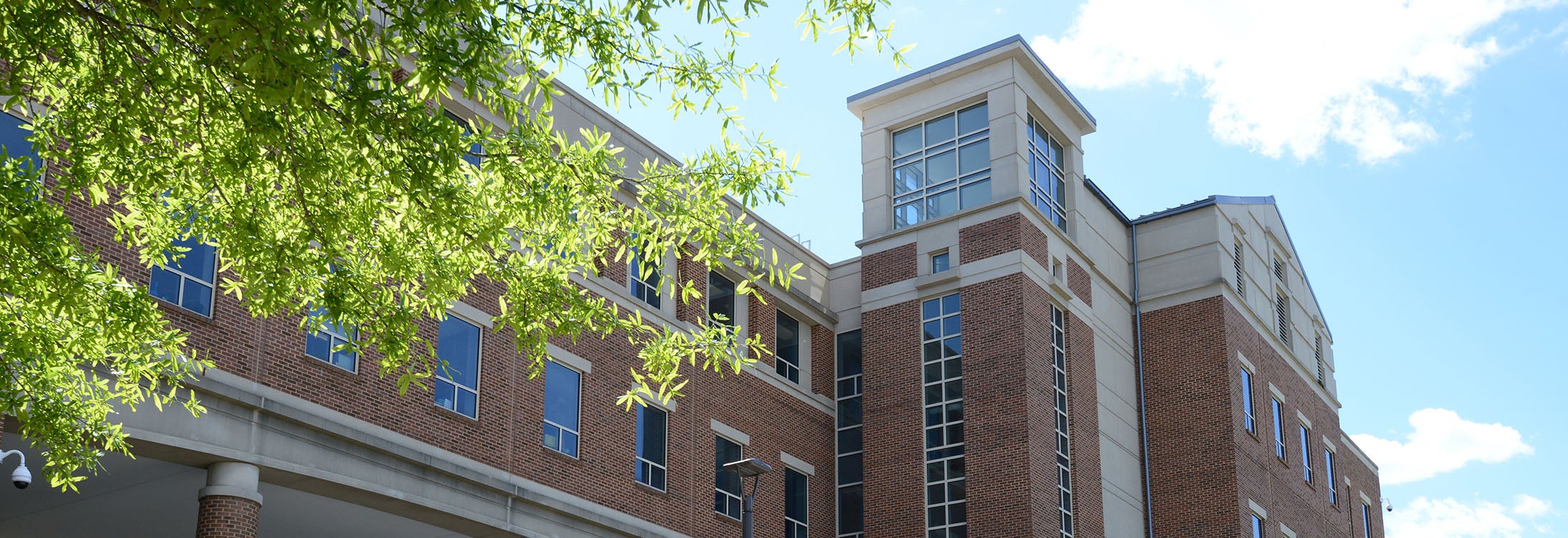ADDRESSING NURSING SHORTAGE

Dr. Jan Tillman, College of Nursing clinical associate professor and board-certified family nurse practitioner, is coordinating a collaboration between CON and the North Carolina Department of Health and Human Services as a volunteer, pairing health care providers across N.C. with long-term care facilities that need them urgently. (Contributed photo)
An East Carolina University faculty member who helps Doctor of Nursing Practice (DNP) students conceptualize and strategize their four-semester projects is now on the other side, working on her own project to improve population health across North Carolina.
Dr. Jan Tillman, a clinical associate professor at the College of Nursing and board-certified family nurse practitioner, has been coordinating a collaboration between the ECU College of Nursing and the North Carolina Department of Health and Human Services (NCDHHS) as a volunteer, pairing health care providers across the state with the long-term care facilities that need them urgently.
With help from nursing faculty members Karen Krupa and Dr. Robin Webb Corbett organizing data, Tillman has referred more than 1,600 unique health care professionals to 36 facilities throughout North Carolina.
It began with a question that many at ECU have asked in response to the COVID-19 pandemic:
‘What can we do to help?’
Tillman and other faculty members were on a conference call that Gov. Roy Cooper and NCDHHS Secretary Mandy Cohen did in early March, briefing the North Carolina Nurses Association on the COVID-19 pandemic and the things being done across the state’s health care system to manage all the new challenges it presented. Toward the end of the call, members of the NCNA were given an opportunity to ask questions.
As the College of Nursing’s DNP project director, Tillman works with DNP students who are practicing nurses to define and develop a four-semester project aimed at improving health care across the state. Many of these students have been on the front lines treating COVID-19 patients as they pursue their degrees, and she’s helped them to develop projects around their experiences, ensuring evidence-based nursing strategies for patients diagnosed with the novel disease, working with long-term care facilities to troubleshoot unique staffing constraints, or envisioning and implementing innovative strategies for long-term care outbreaks as the virus continues to impact NC.
A nurse practitioner herself, Tillman said she and some of the other ‘more seasoned’ faculty members — believed to be at a higher risk for COVID-19 — felt a twinge of guilt for not directly caring for patients amid all the additional need for health care providers.
“Honestly, I was having a bit of poser syndrome, because here I am a nurse practitioner and I was not doing anything for people in North Carolina,” Tillman said. “I was listening to my students call me and tell me about everything they were experiencing on the front line — they were setting up COVID units, they were working 60, 70, 80 hours a week — that kind of thing. I wasn’t having any of this experience and it made me feel as though I wasn’t relevant.”
So, when Cohen asked for questions from members of the NCNA, Tillman asked the question that had been nagging at her.
“My question was how could those of us who were a bit more seasoned — that should not be on the front line —how could we contribute? Our skillset is more from an administrative planning, strategic operations point of view. That’s what we do for a living at this point in time and we wanted to contribute using those skills to give back while protecting ourselves,” Tillman said.
Cohen took the question back to her team, and a few days later, Tillman received a call from one of Cohen’s DHHS colleagues to discuss how ECU might be able to help.
“What I had them do was just tell me things that they were experiencing that they didn’t have any answers for and let me see where the College of Nursing could fit in,” Tillman said.
One of the things mentioned was that many long-term care facilities throughout the state were facing severe staffing shortages, and DHHS was tasked with finding ways to help. Tillman recognized this as a problem that the College of Nursing could potentially help to solve, and that afternoon she had a conference call with the DHHS team working on the project.
“I started thinking about it with them,” Tillman said. “I started thinking ‘how can we streamline this process?’”
Together they came up with a plan to pair unemployed or underemployed Registered Nurses and Certified Nursing Assistants with facilities, particularly long-term care facilities, that are seeking to urgently hire staff for temporary, part-time or full-time roles. Interested health care providers submit their information online. Meanwhile, Tillman and her partners receive a daily spreadsheet of the needs from facilities across the state and call them to further assess their unique needs. Then, they asses the list of health care providers available to work in the area and send the nurses an email about the organization(s) that may be interested in hiring them.
“We started really simplifying the process. We came up with a plan and now it’s very strategically managed. Healthcare professionals can register online to provide staffing assistance as temporary employees or as volunteers. I handle the folks who are looking for part-time or per diem employment with long-term care facilities. The volunteers are handled by the partners at DHHS staff,” Tillman said.
Despite the virus’ increased demands on many health care providers, many others, such as those involved with elective surgeries, have found themselves without work — furloughed or laid off, Tillman said. Giving those workers more opportunities for employment means helping two groups at once.
As she has worked on the project, Tillman said it has allowed her to explain the value of a DNP and how that skillset benefits health care.
“I’ve been able to say that ‘This is what DNPs do,” Tillman said. “We take larger problems and figure it out.”
‘This is what DNPs do’
Students in East Carolina University’s Doctor of Nursing Practice program spend two full years — including four semesters and 500 clinical hours — immersed in the project that will determine whether they will graduate. The projects are chosen by these working nurses that often center on finding solutions and improving methods of care at the health care facilities where they work, or on their professional curiosities. Regardless of the students’ concentration in one of five specialty areas, the projects are aimed at improving population health across North Carolina.
“It could be in a microsystem like with one primary care office. It could be with a health department doing something countywide. It could be with an organization,” Tillman said, adding that the program has several students working on these projects with law enforcement, with Special Olympics and with Research Triangle International. “We are trying to meet the needs of communities by partnering with them on the things they need.”
As DNP project director at the College of Nursing, Tillman emphasizes that these projects are never just academic exercises, but rather exemplify the way that DNPs move forward to practice. As she gives a master class of that practice in action, she has already begun thinking about how the new connections she’s made with NCDHHS could result in similar collaborations in the future.
“We’re starting to begin conversations (with DHHS) about how we can continue a relationship in order to expand work that DNPs are doing on a statewide level for their projects,” Tillman said. “My goal would be to expand our offerings and partnerships with the state so that we have some students who can take on statewide issues such as ‘How do you work out staffing at long term care facilities when there’s an emergency?’
With an ongoing partnership with the state, health systems and other organizations, Tillman said there are a multitude of ways that the students could be contributing to the state’s needs while also fulfilling their educational requirements.
“If the state needs volunteer help, and we have 50 DNP students each year who need to devote four semesters of work to a project —we can simply marry everyone’s needs and make sense out of health care dilemmas,” Tillman said. “When our students graduate as doctorally-prepared nurse practitioners serving in rural or urban communities, they innately take some responsibility in that community to keep those passions for care burning.
“We have a great opportunity in healthcare education — not just to develop student awareness for doing a procedure, or sutures, or developing care plans — we have the responsibility and the opportunity to develop their citizenship in the health care marketplace, and that is my ultimate goal.”
